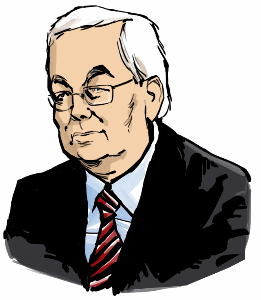© Gunnar Tómasson
8. nóvember 2015
I. Silfr Egils – Kristnitaka
(Egilssaga, 85. k.)
438521
Þat var á dögum Hákonar ins ríka öndverðum, þá var Egill Skalla-Grímsson á níunda tigi, ok var hann þá hress maðr fyrir annars sakar en sjónleysis. Þat var um sumarit, er menn bjuggust til þings, þá beiddi Egill Grím at ríða til þings með honum. Grímr tók því seinliga. Ok er þau Grímr ok Þórdís töluðust við, þá sagði Grímr henni, hvers Egill hafði beitt. „Vil ek, at þú forvitnist, hvat undir mun búa bæn þessi.‟
Þórdís gekk til máls við Egil, frænda sinn. Var þá mest gaman Egils at ræða við hana. Ok er hon hitti hann, þá spurði hon: „Er þat satt, frændi, er þú vill til þings ríða? Vilda ek, at þú segðir mér, hvat væri í ráðagerð þinni.‟
„Ek skal segja þér,‟ kvað hann, „hvat ek hefi hugsat. Ek ætla at hafa til þings með mér kistur þær tvær, er Aðalsteinn konungr gaf mér, er hvártveggja er full af ensku silfri. Ætla ek at láta bera kisturnar til Lögbergs, þá er þar er fjölmennast. Síðan ætla ek at sá silfrinu, ok þykkir mér undarligt, ef allir skipta vel sín í milli. Ætla ek, at þar myndi vera þá hrundningar eða pústrar, eða bærist at um síðir, at allr þingheimrinn berðist.‟
Silfr Egils
Kristnitaka
(Gnostísk goðsögn)
1 = Mónad/Guð
12685 = Höfðingjaskipti varð í Nóregi. – Alfa setning Kristniþáttar Njálu
7864 = Jesus Patibilis – Sjá lið VI.
401006 = Víg Snorra Sturlusonar – Sjá færslu dags. 3. september 2015.
-5309 = Silfr Egils – Egill sat heima um þingit. (Sjá að neðan)
11000 = Þorgeirr Tjörvason – Heiðinn kemur Kristinn undan feldi
11274 = Fara menn við þat heim af þingi. – Omega setning Kristniþáttar Njálu
438521
II. Þjóðráð…meðan landit er byggt
(Egilssaga, 85. k. – frh.)
781259
Þórdís segir: „Þetta þykkir mér þjóðráð, ok mun uppi, meðan landit er byggt.‟ Síðan gekk Þórdís til tals við Grím ok sagði honum ráðagerð Egils. „Þat skal aldri verða, at hann komi þessu fram, svá miklum firnum.‟ Ok er Egill kom á ræður við Grím um þingferðina, þá talði Grímr þat allt af, ok sat Egill heima um þingit. Eigi líkaði honum þat vel. Var hann heldr ófrýnn.
At Mosfelli var höfð selför, ok var Þórdís í seli um þingit. Þat var eitt kveld, þá er menn bjuggust til rekkna at Mosfelli, at Egill kallaði til sín þræla tvá, er Grímr átti. Hann bað þá taka sér hest. „Vil ek fara til laugar.‟ Ok er Egill var búinn, gekk hann út ok hafði með sér silfrkistur sínar. Hann steig á hest, fór síðan ofan eftir túninu fyrir brekku þá, er þar verðr, er menn sá síðast.
En um morgininn, er menn risu upp, þá sá þeir, at Egill hvarflaði á holtinu fyrir austan garð ok leiddi eftir sér hestinn. Fara þeir þá til hans ok fluttu hann heim. En hvárki kom aftr síðan þrælarnir né kisturnar, ok eru þar margar gátur á, hvar Egill hafi fólgit fé sitt.
Fyrir austan garð at Mosfelli gengr gil ofan ór fjalli. En þat hefir orðit þar til merkja, at í bráðaþeyjum er þar vatnfall mikit, en eftir þat er vötnin hafa fram fallit, hafa fundizt í gilinu enskir penningar. Geta sumir menn þess, at Egill muni þat fét hafa fólgit. Fyrir neðan tún at Mosfelli eru fen stór ok furðuliga djúp. Hafa þat margir fyrir satt, at Egill muni þar hafa kastat í fé sínu. Fyrir sunnan ána eru laugar ok þar skammt frá jarðholur stórar, ok geta þess sumir, at Egill mundi þar hafa fólgit fé sitt, því at þangat er oftliga sénn haugaeldr. Egill sagði, at hann hefði drepit þræla Gríms, ok svá þat, at hann hafði fé sitt fólgit, en þat sagði hann engum manni, hvar hann hefði fólgit.
Egill tók sótt eftir um haustit, þá er hann leiddi til bana. En er hann var andaðr, þá lét Grímr færa Egil í klæði góð. Síðan lét hann flytja hann ofan í Tjaldanes ok gera þar haug, ok var Egill þar í lagðr ok vápn hans ok klæði. 781159 + 100 (Sögulok) = 781259
III. Silfr Egils – Arfleifð höfunda
(Saga-Shakespeare goðsögn)
Felustaður Silfurs Egils
Reykholtsmáldagi
(Elzta varðveitt handrit)
18278 = Skrín þat es stendr á altara meþ helgo domo
19936 = gefa þeir Magn oc Snorre at helfninge hvar þeirra
21953 = oc es þetta kirkio fé umb fram of þat es áþr es talet.
60167
Í minningu arfleifðar
(First folio – Ben Jonson)
11150 = To the memory of my beloved,
5329 = The AVTHOR
10685 = MR. WILLIAM SHAKESPEARE
10274 = AND what he hath left us.
37438
781259 + 60167 + 37438 = 878864
IV. William Shakespeare – ‟Take him for all in all‟
(Inscription on Shakespeare statue in Stratford)
Arfleifð Snorra og Sturlu
7196 = Bergþórshváll
5309 = Silfr Egils
11931 = Táknmálslykill Reykholtsmáldaga
24436
Ophelia – Remembrances of Hamlet
24436 = Rich gifts wax poore, when giuers proue vnkinde.
V. The Tragedie of Hamlet, Prince of Denmarke
(Hamlet, Act III, Sc. i, First folio, 1623)
878864
5415 = Enter Hamlet.
Hamlet
18050 = To be, or not to be, that is the Question:
19549 = Whether ’tis Nobler in the minde to suffer
23467 = The Slings and Arrowes of outragious Fortune,
17893 = Or to take Armes against a Sea of troubles,
16211 = And by opposing end them: to dye, to sleepe
13853 = No more; and by a sleepe, to say we end
20133 = The Heart-ake, and the thousand Naturall shockes
19800 = That Flesh is heyre too? ‘Tis a consummation
17421 = Deuoutly to be wish’d. To dye to sleepe,
19236 = To sleepe, perchance to Dreame; I, there’s the rub,
19794 = For in that sleepe of death, what dreames may come,
21218 = When we haue shufflel’d off this mortall coile,
20087 = Must giue vs pawse. There’s the respect
13898 = That makes Calamity of so long life:
24656 = For who would beare the Whips and Scornes of time,
24952 = The Oppressors wrong, the poore mans Contumely,
18734 = The pangs of dispriz’d Loue, the Lawes delay,
16768 = The insolence of Office, and the Spurnes
20720 = That patient merit of the vnworthy takes,
17879 = When he himselfe might his Quietus make
21696 = With a bare Bodkin? Who would these Fardles beare
17807 = To grunt and sweat vnder a weary life,
17426 = But that the dread of something after death,
21935 = The vndiscouered Countrey, from whose Borne
20927 = No Traueller returnes, Puzels the will,
19000 = And makes vs rather beare those illes we haue,
20119 = Then flye to others that we know not of.
20260 = Thus Conscience does make Cowards of vs all,
18787 = And thus the Natiue hew of Resolution
21086 = Is sicklied o’re, with the pale cast of Thought,
17836 = And enterprizes of great pith and moment,
22968 = With this regard their Currants turne away,
18723 = And loose the name of Action. Soft you now,
16746 = The faire Ophelia? Nimph, in thy Orizons
9726 = Be all my sinnes remembred.
Ophelia
5047 = Good my Lord,
17675 = How does your Honor for this many a day?
Hamlet
17391 = I humbly thanke you: well, well, well.
Ophelia
15437 = My Lord, I haue Remembrances of yours,
14927 = That I haue longed long to re-deliuer.
12985 = I pray you now, receiue them.
Hamlet
12520 = No, no, I neuer gaue you ought.
Ophelia
19402 = My honor’d Lord, I know right well you did,
24384 = And with them words of so sweet breath compos’d,
19172 = As made the things more rich, then perfume left:
14959 = Take these againe, for to the Noble minde
24436 = Rich gifts wax poore, when giuers proue vnkinde.
5753 = There my Lord.
878864
VI. Jesus Patibilis – Gnostic Christ
Hárr-Jafnhárr-Þriði
Jesus is here the god with the mission of revelation to man, […] That it is he who makes Adam eat from the Tree of Knowledge explains the Christian accusation that the Manichaeans equated Christ with the serpent in Paradise. Of the content of his revelation, the doctrine concerning „his own self cast into all things” requires comment. It expresses the other aspect of this divine figure: in addition to being the source of all revelatory activity in the history of mankind, he is the personification of the Light mixed into matter; that is, he is the suffering form of Primal Man. This original and profound interpretation of the figure of Christ was an important article of the Manichaean creed and is known as the doctrine of the Jesus patibilis, the „passible Jesus” who „hangs from every tree,” „is served up bound in every dish,” „every day is born, suffers and dies.” He is dispersed in all creation, but his most genuine realm and embodiment seems to be the vegetable world, that is, the most passive and the only innocent form of life. Yet at the same time with the active aspect of his nature he is transmundane Nous [an intelligent purposive [my emphasis] principle of the world] who, coming from above, liberates this captive substance and continually until the end of the world collects it, i.e. himself, out of the physical dispersal. (Hans Jonas, The Gnostic Religion – The message of the alien God and the beginnings of Christianity, Second edition, enlarged, Bacon Press, Boston, 1963, bls. 228-229.)
***
Reiknivél sem umbreytir stöfum í tölugildi er á netinu:
http://www.light-of-truth.com/ciphersaga.htm

 Gunnar Tómasson
Gunnar Tómasson